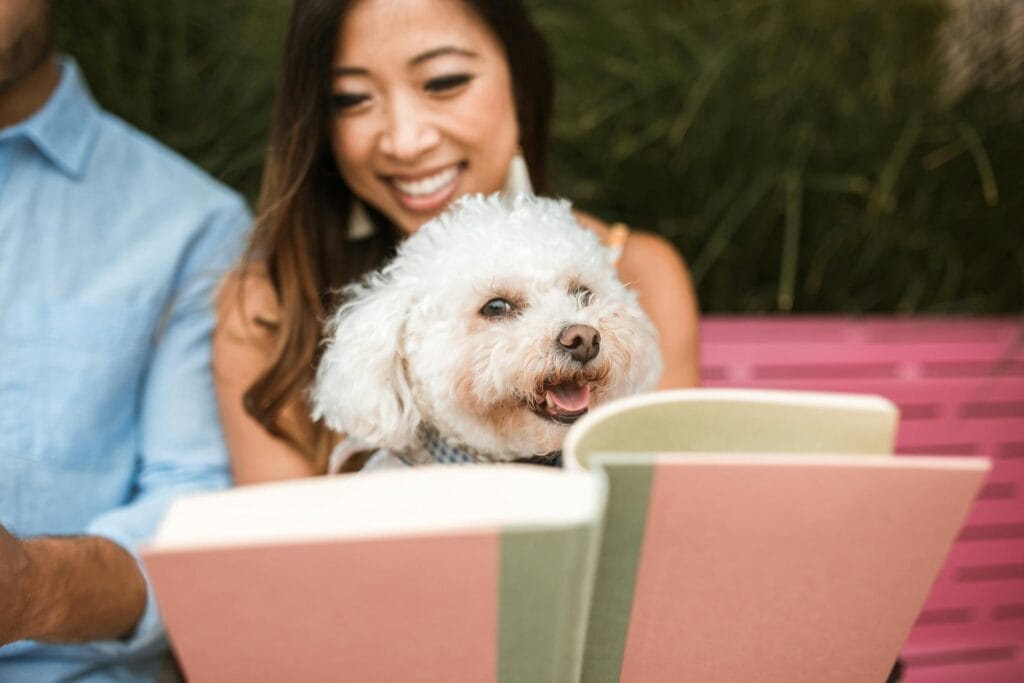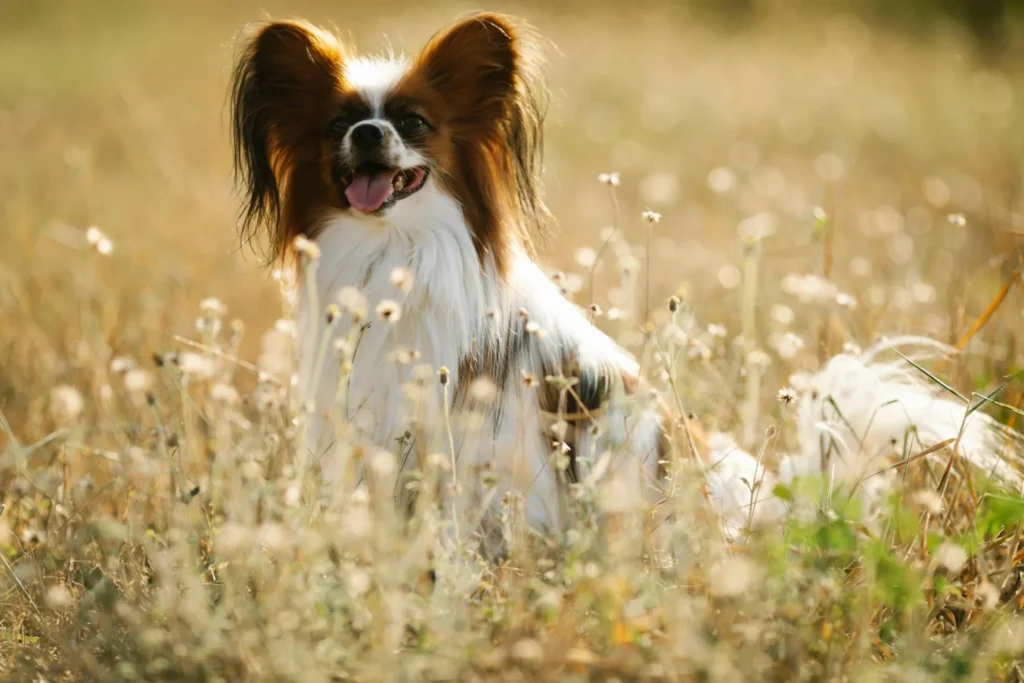🐾 Introduction: The Curious Case of Poodle Reading
Have you ever caught your poodle staring intently at your newspaper or book and wondered, “Can my furry friend actually read?” It’s a question that’s sparked curiosity and debate among dog lovers and researchers alike. In this comprehensive guide, we’ll dive deep into the fascinating world of poodle cognition, exploring their intelligence, learning capabilities, and the truth behind their apparent “reading” abilities.
Poodles, known for their exceptional intelligence and eagerness to please, have often surprised their owners with behaviors that seem almost human-like. But can these curly-coated canines truly decipher the written word? Let’s embark on this intellectual journey to uncover the truth about poodle literacy.

🧠 Understanding Poodle Intelligence
Before we delve into whether poodles can read, it’s crucial to understand their cognitive abilities. Poodles consistently rank among the most intelligent dog breeds, often placing second only to Border Collies in various canine intelligence studies.
Poodle IQ: Breaking Down the Brilliance
Poodles excel in various areas of intelligence:
- Working Intelligence: 🏆 They quickly learn and obey commands.
- Adaptive Intelligence: 🧩 Poodles can solve problems and adapt to new situations.
- Instinctive Intelligence: 🐾 They have strong natural abilities, often related to their original purpose as water retrievers.
Let’s compare poodle intelligence to other breeds:
| Breed | Obedience | Problem-Solving | Adaptability | Overall Intelligence |
|---|---|---|---|---|
| Poodle | 🌟🌟🌟🌟🌟 | 🌟🌟🌟🌟🌟 | 🌟🌟🌟🌟🌟 | 🧠🧠🧠🧠🧠 |
| Border Collie | 🌟🌟🌟🌟🌟 | 🌟🌟🌟🌟🌟 | 🌟🌟🌟🌟 | 🧠🧠🧠🧠🧠 |
| German Shepherd | 🌟🌟🌟🌟 | 🌟🌟🌟🌟 | 🌟🌟🌟🌟🌟 | 🧠🧠🧠🧠 |
| Golden Retriever | 🌟🌟🌟🌟 | 🌟🌟🌟 | 🌟🌟🌟🌟🌟 | 🧠🧠🧠🧠 |
| Chihuahua | 🌟🌟🌟 | 🌟🌟 | 🌟🌟🌟 | 🧠🧠🧠 |
👁️ How Poodles Process Visual Information
To understand whether poodles can read, we need to explore how they process visual information. While dogs don’t see the world exactly as we do, their vision is well-adapted to their needs.
Poodle Vision vs. Human Vision
| Aspect | Poodles | Humans |
|---|---|---|
| Color Vision | Dichromatic (two-color) | Trichromatic (three-color) |
| Night Vision | 🌙🌟🌟🌟🌟 | 🌙🌟🌟 |
| Motion Detection | 🏃♂️🌟🌟🌟🌟🌟 | 🏃♂️🌟🌟🌟 |
| Detail Perception | 👁️🌟🌟 | 👁️🌟🌟🌟🌟 |
Poodles excel at detecting motion and seeing in low light conditions, but they don’t perceive fine details as well as humans do. This difference in visual processing is crucial when considering their ability to read.
📖 The Reading Process: Human vs. Poodle
To determine if poodles can read, we need to understand what reading entails and compare it to poodle cognitive abilities.
Components of Reading
- Visual Recognition: 👁️ Identifying shapes of letters and words
- Phonological Processing: 🔊 Connecting letters to sounds
- Comprehension: 💡 Understanding the meaning of words and sentences
- Working Memory: 🧠 Holding information while processing new input
Can Poodles Master These Skills?
Let’s break down each component:
- Visual Recognition: ✅ Poodles can recognize shapes and patterns, but not with the detail required for reading.
- Phonological Processing: ❌ While poodles can associate sounds with commands, they don’t connect sounds to written symbols like humans do.
- Comprehension: ✅ Poodles can understand spoken words and phrases, but not written text.
- Working Memory: ✅ Poodles have good working memory, especially for tasks they’re trained in.
🎓 Poodle Learning: What They Can Actually Do
While poodles can’t read in the human sense, they are capable of remarkable feats of learning and recognition. Let’s explore what poodles can actually do that might be mistaken for reading.
1. Word Recognition
Poodles can learn to recognize the shape of specific words or commands. This isn’t reading, but rather associating a visual pattern with a learned behavior.
2. Number Recognition
Some poodles have been trained to recognize and respond to numerical symbols, though this is more about pattern recognition than true numerical understanding.
3. Object Identification
Poodles excel at identifying and categorizing objects, which can sometimes look like they’re “reading” labels.
4. Emotional Recognition
They’re adept at reading human emotions, which might make it seem like they’re understanding written content when they’re actually responding to their owner’s reactions.
🧪 Scientific Studies on Canine Cognition
Several studies have explored dogs’ cognitive abilities, shedding light on what poodles might be capable of:
- Rico the Border Collie (2004): Demonstrated the ability to learn object names quickly, similar to human toddlers.
- Chaser the Border Collie (2011): Learned over 1,000 object names, showing dogs’ capacity for large vocabularies.
- Dog fMRI Studies (2012-present): Revealed that dogs process words in the left hemisphere of their brain, similar to humans.
While these studies don’t prove that dogs can read, they demonstrate their impressive cognitive abilities and potential for understanding human communication.
🎭 The “Clever Hans Effect”: When Dogs Seem to Read
Sometimes, poodles might appear to be reading due to a phenomenon known as the “Clever Hans Effect.” This refers to an animal’s ability to pick up on subtle, unintentional cues from humans.
How It Works:
- The owner believes their poodle can read.
- They show the poodle a word or phrase.
- The owner unconsciously gives subtle cues (body language, facial expressions).
- The poodle responds based on these cues, appearing to have read the text.
This effect demonstrates poodles’ exceptional ability to read human behavior rather than actual text.
🏋️♀️ Training Poodles: Literacy-Like Skills
While poodles can’t truly read, you can train them in skills that might look like reading to the casual observer. Here are some activities that showcase poodle intelligence:
- Word Card Tricks: Train your poodle to associate specific word cards with actions.
- Number Games: Teach them to “count” by responding to number cards.
- Object Matching: Have them match toy names to picture cards.
- Scent Reading: Train them to identify specific scents associated with words.
Remember, these tricks demonstrate poodles’ pattern recognition and associative learning skills, not actual reading ability.
🌟 Famous “Reading” Poodles
While no poodle has truly learned to read, some have gained fame for their seemingly literate abilities:
- Prince Charming: A standard poodle who appeared to read simple words and perform corresponding actions.
- Mister Smarty Pants: A toy poodle who could “spell” words by selecting letter cards.
These poodles showcase the breed’s intelligence and trainability, even if they’re not actually reading.
📊 Comparing Poodle “Reading” Abilities
Let’s compare how poodles stack up against humans and other animals in literacy-like skills:
| Species | Word Recognition | Comprehension | Symbol Association | Overall “Reading” Ability |
|---|---|---|---|---|
| Human | 🌟🌟🌟🌟🌟 | 🌟🌟🌟🌟🌟 | 🌟🌟🌟🌟🌟 | 📚📚📚📚📚 |
| Poodle | 🌟🌟🌟 | 🌟 | 🌟🌟🌟🌟 | 📚 |
| Chimpanzee | 🌟🌟🌟 | 🌟🌟 | 🌟🌟🌟🌟 | 📚📚 |
| Parrot | 🌟🌟 | 🌟 | 🌟🌟🌟 | 📚 |
🧬 The Genetic Basis of Poodle Intelligence
Poodles’ impressive cognitive abilities have a genetic foundation. Recent studies in canine genomics have identified several genes associated with intelligence in dogs:
- CTNND2 gene: Linked to cognitive function and neural development.
- FNBP1L gene: Associated with synaptic transmission and learning.
- SLC6A3 gene: Involved in dopamine transport, affecting attention and memory.
While these genes contribute to poodles’ smarts, they don’t confer the ability to read in the human sense.
🚀 The Future of Canine Cognition Research
As our understanding of dog cognition grows, we may uncover even more impressive abilities in poodles and other breeds. Some areas of ongoing research include:
- Canine fMRI studies: Understanding how dogs process language and visual information.
- Comparative cognition: Exploring similarities between dog and human cognitive development.
- Genetic studies: Identifying more genes linked to canine intelligence.
While it’s unlikely we’ll discover that poodles can truly read, we may find new ways they can understand and interact with human language and symbols.
📚 Conclusion: The Truth About Poodle “Reading”
In conclusion, while poodles are incredibly intelligent and can perform impressive feats of learning and recognition, they cannot read in the way humans do. Their apparent “reading” abilities are actually a combination of:
- Exceptional pattern recognition
- Strong associative learning skills
- Keen ability to read human cues
- Impressive memory for learned commands
These skills, combined with their eagerness to please, make poodles seem almost human-like in their cognitive abilities. However, true reading requires a level of abstract thinking and symbol processing that is unique to human cognition.
Instead of trying to teach your poodle to read, focus on nurturing their natural intelligence through training, puzzle toys, and interactive games. These activities will keep your poodle mentally stimulated and strengthen your bond.
Remember, your poodle’s inability to read doesn’t diminish their intelligence or the special connection you share. Their unique way of understanding the world around them is part of what makes the human-canine bond so special and rewarding.
❓ FAQs About Poodles and Reading
- Q: Can poodles understand written words?
A: No, poodles can’t understand written words. They can associate shapes or patterns with commands, but this isn’t true reading. - Q: Are there any dogs that can actually read?
A: No known dogs can read in the way humans do. Some dogs can recognize word shapes or respond to written commands, but this is different from reading comprehension. - Q: How do I know if my poodle is trying to read?
A: Your poodle isn’t trying to read. They may be responding to your reactions, recognizing patterns, or simply showing curiosity about what you’re focusing on. - Q: Can I teach my poodle to read simple words?
A: You can teach your poodle to associate specific word shapes with actions, but this isn’t true reading. It’s more like recognizing a symbol. - Q: Do poodles understand numbers better than words?
A: Poodles don’t understand numbers or words conceptually. They can be trained to respond to number symbols, but they don’t grasp numerical concepts. - Q: Are there benefits to pretending to teach my poodle to read?
A: While poodles can’t actually read, training games involving words or symbols can provide mental stimulation and strengthen your bond. - Q: Do poodles recognize their own names when written?
A: Poodles might recognize the shape of their written name if trained, but they don’t read it. They respond to the sound of their name when spoken. - Q: Can poodles understand sign language?
A: Poodles can learn to respond to hand signals, which is a form of visual communication, but it’s not the same as understanding human sign language. - Q: Are there any other animals that can read?
A: No animals can read in the way humans do. Some primates have been taught to recognize symbols, but this isn’t the same as reading comprehension. - Q: How can I stimulate my poodle’s mind if they can’t read?
A: Puzzle toys, obedience training, agility courses, and interactive games are great ways to keep your poodle’s mind active and engaged.
Remember, while poodles can’t read, their intelligence and eagerness to learn make them wonderful companions. Focus on activities that suit their natural abilities and strengths for a fulfilling relationship with your furry friend. 🐾📚💖



